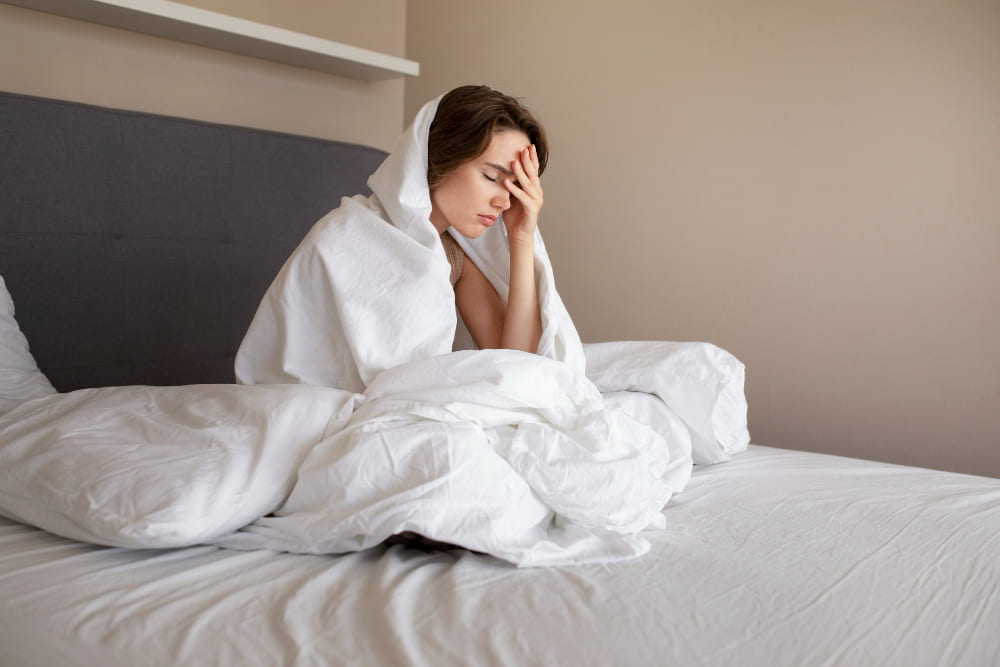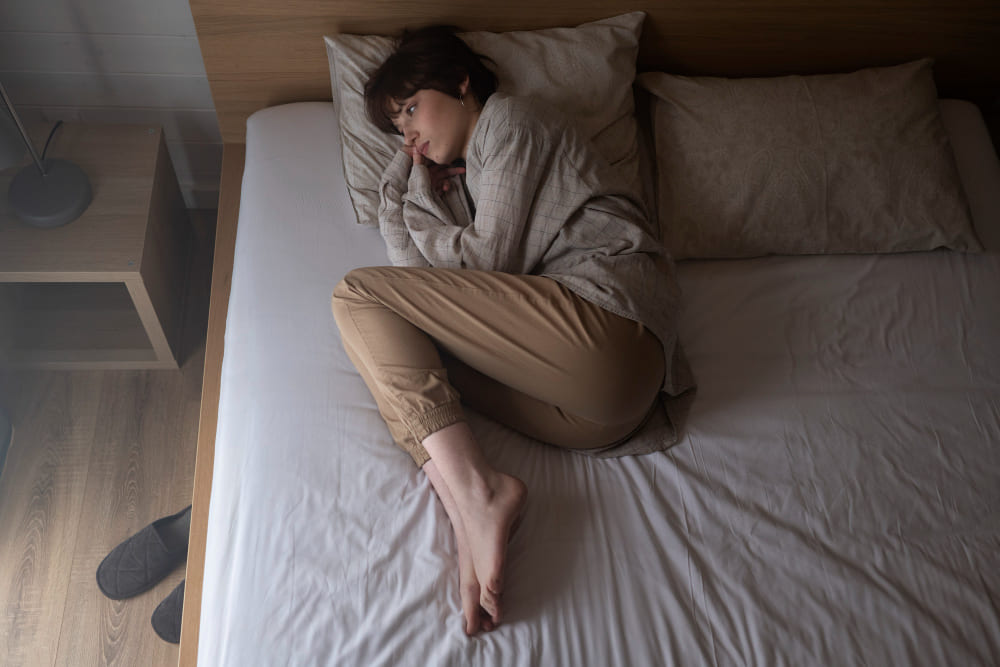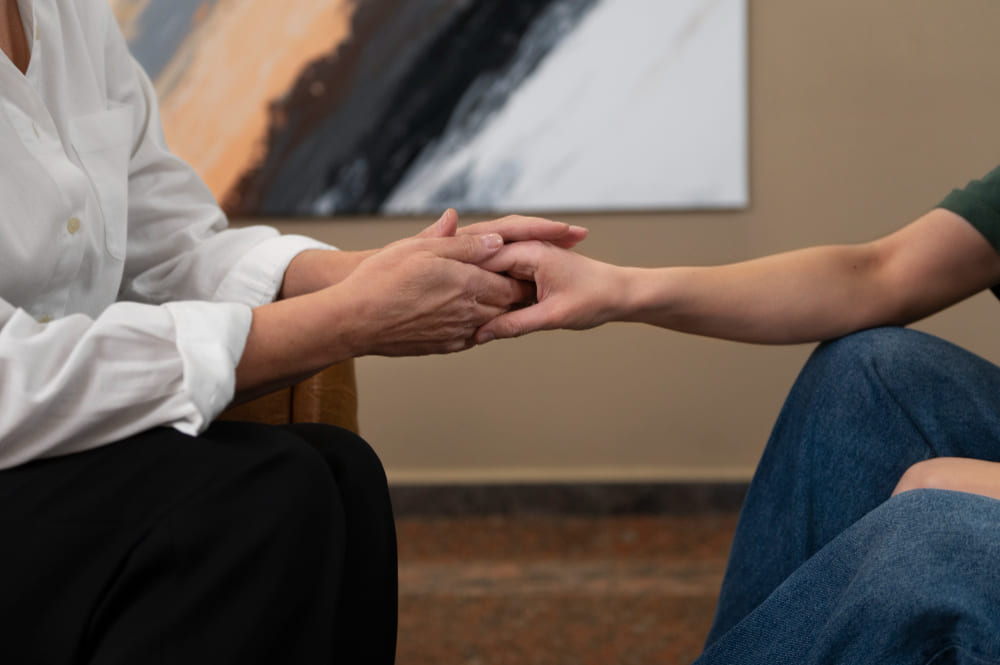Stress, depression, social isolation, post-traumatic stress disorder: bed bugs can cause serious psychological damage. Unfortunately, this risk is rarely taken seriously and victims often feel helpless. Here’s why.
The article in brief
➡️ Bed bugs have a strong psychological impact, causing stress, anxiety, sleep disorders and sometimes depression.
➡️ Constant stress is caused by fear of bites, anxiety about infestation and feelings of helplessness.
➡️ Post-traumatic stress disorder can develop, including insomnia, panic attacks and constant hypervigilance.
➡️ Social isolation and stigmatisation are common, due to shame or fear of infecting loved ones.
➡️ Psychological support can help overcome this ordeal and restore a normal quality of life.
Bed bugs: the risks to mental health

Sleep disorders
It should be remembered that bed bugs are nocturnal insects that feed on human blood while we sleep. As a result, nights can be very disturbed.
Nights punctuated by fear and itching
The mere idea that bed bugs could be crawling on your skin while you sleep causes intense stress. Many victims report fragmented sleep, waking up with a start and being constantly hypervigilant, on the lookout for the slightest movement or tingling sensation on their body. These sleep disturbances are exacerbated by the bed bug bites themselves, which cause intense itching, making it difficult to fall asleep.
A vicious circle that is exhausting
Irritability, concentration problems and loss of motivation, combined with the fatigue that builds up night after night, quickly take their toll on mental and physical health. Some people develop chronic insomnia for fear of being bitten or at the thought of these pests being in their bedroom. This lack of sleep also weakens the immune system and worsens the psychological state of those affected by the infestation.
➡️ Good to know: according to INELP, bed bugs affect all levels of Maslow’s pyramid, impacting safety, health and rest, which are essential pillars of mental and physical well-being.
Stress
Far beyond the simple discomfort caused by bites, the presence of bed bugs is a source of intense stress. The fear of being bitten during the night, the anxiety of seeing these insects reappear and the feeling of having one’s privacy invaded create a permanent climate of worry.
➡️ According to this study conducted in France, the presence of bed bugs causes high levels of stress in two-thirds of participants. Researchers emphasise that social isolation is an aggravating factor.
This constant stress can have significant consequences for the mental health of victims: nervousness, irritability, loss of concentration and a feeling of helplessness in the face of the situation. For many, it becomes impossible to relax fully until the home has been completely rid of these pests.

Anxiety
Bed bugs cause widespread anxiety in many victims. This is directly linked to uncertainty: ‘Will I get bitten again tonight?’ ‘Are there still some in my bed or on my clothes?’ These obsessive questions disrupt daily life to the point of becoming a real anxiety disorder in some people.
It should be noted that significant anxiety can lead to symptoms such as palpitations, sweating, a feeling of suffocation, constant distress and even panic attacks.
Depression
Bed bug infestations can also lead to episodes of depression. The combination of sleep deprivation, constant stress and feelings of helplessness can cause a real mental breakdown.
Many victims report a loss of motivation, desire and pleasure in their daily lives. Fatigue caused by sleep disorders exacerbates this depressive state, as do feelings of shame or fear of judgement by others. Some people no longer dare to invite friends or family over, which further increases their isolation.
➡️ The longer the infestation lasts, the greater the risk of depression. This is why it is important to act quickly, but also to seek psychological support if the situation becomes too difficult to manage alone.

The phobia
In some victims, the presence of bed bugs leads to the development of a real phobia, called entomophobia (concerning insects in general).
This excessive fear manifests itself in:
➡️ Intense panic at the sight of a bed bug or even at the mention of the word.
➡️ Avoidance behaviours (refusal to sleep in certain places, fear of travelling or staying in hotels for fear of infestation).
➡️ Physical reactions such as trembling, sweating, rapid heartbeat, or even feeling unwell.
According to psychologists, this type of phobia can persist even after the pests have been eradicated, as the person remains scarred by the traumatic experience.
Post-traumatic disorders
Victims sometimes develop symptoms similar to post-traumatic stress disorder (PTSD), similar to those observed after a violent or dangerous event.
These symptoms include:
➡️ Severe insomnia,
➡️ Constant hypervigilance,
➡️ Flashbacks or intrusive images,
➡️ Social avoidance,
➡️ Physical reactions, such as palpitations or sweating when the problem is mentioned.
In these cases, psychological support is essential to help the person overcome this traumatic episode.

Social isolation
Having bed bugs in your home often means social withdrawal. For fear of infecting their loved ones or their living spaces, many people prefer to avoid visitors and decline invitations.
Shame also plays an important role. In the collective imagination, bed bugs = poor hygiene. It is important to remember that this is not the case at all. An infestation can affect anyone, regardless of their environment or hygiene habits. These pests ‘travel’ from one place to another by hiding in clothing, bags, furniture, etc.
Unfortunately, stigmatisation is common. Many victims feel deeply embarrassed to talk about it for fear of being judged.
This isolation can have serious consequences for mental health:
➡️ feelings of loneliness and misunderstanding,
➡️ loss of social ties and support,
➡️ anxiety and depression.
Psychological support and solutions
There is only one rule: do not face this problem alone! It is essential to talk to those around you or to healthcare professionals.

Talk to a loved one or a support group
Expressing your experiences to people you trust or other victims can bring real relief and break the isolation.
The following Facebook groups are particularly useful:
Consult a psychologist or psychiatrist
If you are experiencing intense stress, anxiety attacks, uncontrollable fear or symptoms of depression, a mental health professional can help you:
- Put what you are going through into words,
- Identify and calm your fears,
- Regain a sense of security, which is essential for restful sleep.
Good to know: some university hospitals have a parasitology department. Don’t hesitate to ask for more information.
Learn about bed bugs
This is common sense advice. You need to know your enemy to fight it better.
Serenid offers a number of useful resources, for example:
- The complete protocol against bed bugs
- Understanding bed bugs
- Call in a trusted professional for bed bugs
Rest assured, effective treatments are available!

In conclusion
Treating bed bugs is essential, but taking care of your mental health is just as important. Never minimise your psychological distress. If the problem persists despite treatment, consult a professional quickly to avoid the trauma becoming ingrained.

